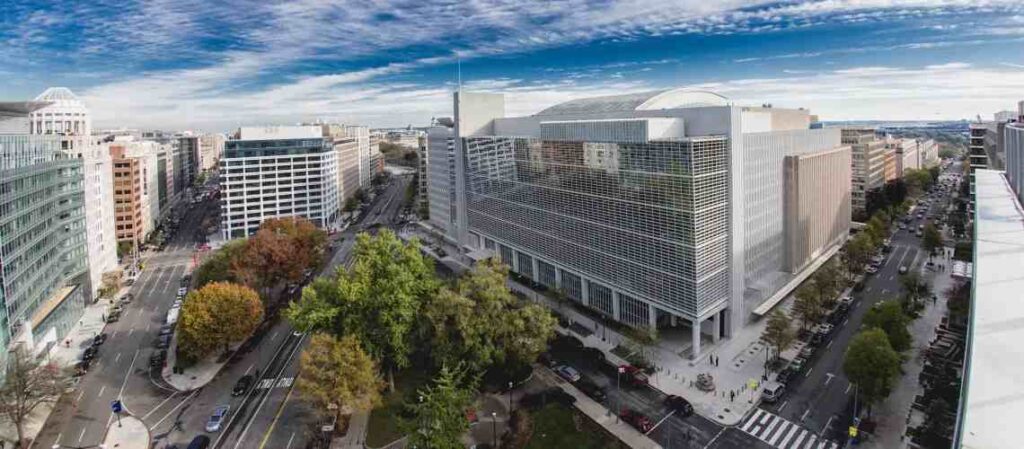Headquarters of IMF Explore the pivotal role and global impact of the International Monetary Fund’s headquarters in Washington, D.C. Discover its influence on economic policies, collaborative efforts, architectural significance, and future developments shaping the world of finance.

Headquarters of IMF: A Global Epicenter of Economic Stewardship
Introduction to the IMF
The International Monetary Fund (IMF) stands as a pinnacle of global financial governance. At its core lies an institution dedicated to fostering monetary cooperation and ensuring the stability of the international monetary system.
Understanding the Purpose of IMF Headquarters
The headquarters of the IMF serves as more than just a physical location. It symbolizes the essence of collaborative financial efforts on a global scale.
Location and Design of IMF Headquarters
The IMF Headquarters, situated in Washington, D.C., holds historical significance. Its architectural design reflects a blend of modernity and functional elegance, signifying the institution’s commitment to progressive financial governance.
Historic Context of Headquarters’ Location
The choice of Washington, D.C., as the IMF’s headquarters was a result of post-World War II geopolitical dynamics. This strategic placement facilitated proximity to other key global financial institutions.
Architectural Significance
The building’s design, characterized by its sleek lines and structural integrity, symbolizes transparency and collaboration. The iconic structure stands as a testament to the IMF’s commitment to fostering an open dialogue among nations.
Significance of IMF Headquarters in Global Finance
The headquarters acts as a focal point for shaping economic policies and strategies on a global scale. Its influence extends beyond the physical space, permeating international economic decision-making.
Influence on Economic Policies
Decisions made within the headquarters significantly impact global economic policies, influencing fiscal regulations, currency stability, and debt management worldwide.
Role in International Collaboration
IMF Headquarters serves as a hub for fostering collaboration among member nations, facilitating discussions, and formulating strategies to address global economic challenges collectively.
Operations and Departments within IMF Headquarters
Within the headquarters, various departments collaborate to execute the IMF’s mandate. Departments such as Finance, Research, and Policy Analysis work in unison to achieve the institution’s goals.
Technological Integration at IMF Headquarters
The IMF embraces technological advancements, utilizing cutting-edge tools and systems to enhance its analytical capabilities and operational efficiency.
Environmental Initiatives and Sustainability Efforts
In recent years, the IMF has taken steps to incorporate sustainability into its operations, aiming to reduce its carbon footprint and promote environmentally conscious practices.
Challenges and Criticisms Surrounding IMF Headquarters
Despite its significance, the IMF Headquarters faces criticisms related to its decision-making process, alleged bias, and the impact of its policies on developing nations.
Future Prospects and Developments
The IMF continues to evolve, adapting to changing global dynamics and technological advancements. Future developments aim to address criticisms and enhance its effectiveness.
Conclusion
The IMF Headquarters remains an indispensable institution, serving as a cornerstone of global economic governance. Its influence and significance continue to shape the world’s financial landscape.
Unique FAQs
- What is the role of IMF Headquarters in global economic policymaking?The headquarters plays a crucial role in formulating and influencing global economic policies, impacting fiscal regulations, currency stability, and debt management worldwide.
- How does technology integrate into the operations of IMF Headquarters?The IMF leverages advanced technology to enhance its analytical capabilities and operational efficiency, allowing for more informed decision-making processes.
- What environmental initiatives has the IMF implemented at its Headquarters?In recent years, the IMF has taken steps to promote sustainability and reduce its environmental impact, incorporating eco-friendly practices into its operations.
- What criticisms does the IMF Headquarters face?The headquarters faces criticisms regarding its decision-making processes, alleged bias, and the perceived impact of its policies on developing nations.
- What does the future hold for IMF Headquarters?The IMF aims to evolve, addressing criticisms and leveraging technological advancements to enhance its effectiveness in global economic governance.
